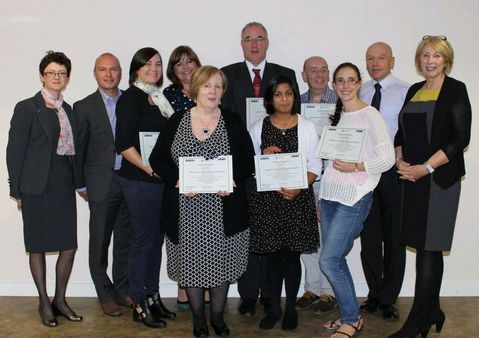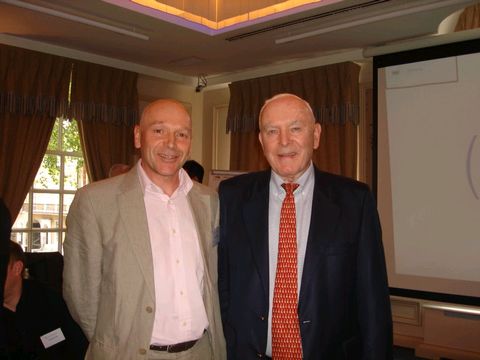
news and articles
EU Accession Projects in Croatia, Moldova & Armenia 2011 - 2014
NOV
04th
Posted by: David Woollard
Since 2011, I have contributed to a number of European Union Accession projects for the Croatian, Moldovan and Armenian Governments, as an associate of NI-CO and the Danish Patent & Trademark Office. These projects have been concerned with Regulatory Impact Assessment (RIA), the Protection of Intellectual Property Rights and Consumer-Protection and Market Surveillance. I've done this by providing an influencing, training, facilitation and coaching skills programme (ITFC), together with a change-management programme.
The ITFC programme started out life as a tradtional "train-the-trainer" (TTT), but it soon become apparent that this was too narrow a brief. Anyway, I thought that an ITFC programme sounded much better (sorry, I know, any opportunity to mention ITFC). Designing and especially delivering these programmes in foreign countries, via interpreters, has been one the most interesting and challenging, but ultimately enjoyable, things that I have done professionally.

This is a photo of St Mark's Church, St Mark's Square, Zagreb. This square is the Croatian equivalent of Downing Street. The Project Office was in the building in the back left-hand corner, whilst the Croatian Parliament is in the building in the back right-hand corner. This, believe it or not, is where we carried out the Croatian RIA ITFC!
Why do you mention this now David, I hear you ask? Well, for a few different reasons. Firstly, in relation to the current debate in the UK about whether or not the UK should stay in the EU; some of my experiences in Croatia reminded me of the fundamental raison d'etre for the creation of the EU in the first place - "to promote peace and security within Europe". Having met people who experienced the horrors of the war that took place there in the early 1990s, I feel that the UK has a responsibility to stay within the EU and work for continued peace. As we have seen recently in the Ukraine, this is not a given. I am also of the view that the UK's economic interests are best served by remaining within the EU.
I remain concerned for what might happen in Eastern Europe more generally, especially in Moldova. This is somewhere else I've spent a bit of time. I have a bit of a soft-spot for the Moldovans, as they are the poorest country in Europe, significantly more so these days even than Albania it would appear. This is partially due to the Russians still being able to exert significant economic pressure, e.g. via gas supplies and their periodic refusal to buy Moldovan wine and agricultural products, as a consequence of Moldova seeking to ultimately join the EU. They have an election scheduled for the end of this month and it appears it is by no means guaranteed that the pro-Western/EU coalition will be re-elecetd. Additionally, there is the unresolved issue of the Transnistria region. This region is effectively a Russian protectorate, similar these days to Crimea and other regions of eastern Ukraine.
In summary then, keep your eye on the news in early December for events in Moldova. I have to say that I'm relieved to be in the UK at the moment, not there, as I suspect it could kick-off big style. In my view, this is the type of european issue that we should be concerned about.
The Use of Dark-Side” Personality Assessment in the Selection Process for Corporate Strategy Graduate Trainees, Swan Housing Association, Essex, Summer 2014
OCT
16th
Posted by: Steven Annison

Background
DWHRC was contacted by Swan in July 2014 to assist them with their recruitment process for Corporate Strategy Graduate Trainees. DWHRC were specifically asked to provide an assessment of the “dark-side” of personality, i.e. to ascertain to what extent applicants might be pre-disposed to behave less-constructively towards other people, and how, this information to sit alongside other facets of a multi-stage and multi-method assessment process for this role.
This “dark-side” analysis was to be done by the use of an appropriate psychometric assessment, namely the “Hogan Development Survey” (HDS). This was primarily due to Malcolm O’Brien, Swan’s Executive Director of People and Communications, having used the HDS successfully in similar circumstances previously.
Approach & Process
A “longlisting” process was carried out, with seven candidates being invited to an initial assessment day. Here, they were asked to complete the HDS on-line, in a supervised environment, thus ensuring that it was indeed the candidates completing the assessment. HDS profiles were obtained for all the candidates on this day.
The candidates were also asked to complete other assessment exercises, including a team-working exercise. A group of Swan managers and HR personnel observed and assessed this exercise.
At the end of this day, a wash-up discussion was held, which involved all the assessors. Each candidate was considered in turn, and a decision made about each of them, as to whether they would be invited to participate in the final stage of the assessment and selection process for this role, which would include a structured, panel-interview, together with a presentation. Five of the seven longlisted candidates were invited to this final stage.
In advance of the final assessment day, DWHRC were asked to carry out a telephone-based interview with each of the five shortlisted candidates, based on each person’s HDS profile and the application which they had submitted for the role in the first place. This was to:
Explore the HDS profiles and applications in more detail.Compile a summative report on each candidate for the interviewing panel, including some “suggested interview questions” and “lines of enquiry”.Explain each candidate’s HDS profile to them in more detail, in order to enhance their self-awareness, consider appropriate developmental actions and thus prepare them for their structured panel-interview.
DWHRC were also asked to carry out a similar telephone interview with the two longlisted candidates who didn’t make it through to the final stage of the process. Here, the emphasis was on helping these two people develop their knowledge of their dark-side tendencies and consider appropriate developmental strategies.
Outcomes
All five shortlisted candidates took part in the final assessment and selection day, with two being offered, and accepting, a position.
The report that DWHRC provided for the interviewing panel, based on the candidates’ HDS profiles and their applications, was considered to have been insightful and helpful, assisting the appointing managers to make more informed decisions than would otherwise have been the case. It is now hoped that the two appointees will perform well in this role, and go on to bigger and better things with Swan in the future.
Informal feedback obtained from the candidates suggested that whilst they had found the process to be exacting, it had also been a valuable learning and development experience for them.
All this suggests that:
Using the HDS carefully, in this way, can provide real benefit to both the appointing managers and the candidates.Well-informed appointment decisions have been made, with both Swan and the appointees being more aware of the appointees’ developmental needs, from the outset.Swan’s reputation with the group of longlisted candidates has been enhanced by how this recruitment and selection process has been designed and carried out.
Successful Conclusion of a Management & Leadership Development Programme for Outlook Care, Essex, October 2014
OCT
14th
Posted by: David Woollard
DWHRC, in collaboration with Amanda Cowan Consulting, recently concluded a Management & Leadership Development Programme for Outlook Care in Essex. The Programme had run over eight months and was rounded-out with a celebratory follow-up session at Outlook Care's flagship establishment, Foxburrow Grange, in Colchester. The photograph below shows the programme participants with their certificates, together with Amanda Cowan, David Woollard and Penny Taylor, CEO of Outlook Care:

Some feedback from the participants includes:
"A really big thank-you for putting this valuable course together and investing your time and knowledge in me. It has made a positive difference and I have very much enjoyed it...a programme I will easily recommend to anyone to complete".
"I feel I have really grown in confidence throughout the past few months. The course came at a good time in my career and having been in this particular post since July 2013, I now feel I own it rather than perhaps playing at it. I feel I need to repeat that actually - I have definitely grown in confidence and am much more self-assured. I appreciate the way the course has made me self-reflect. This is uncomfortable at times, but it enables you to have a good understanding of what works for you and for others".
"It has been a pleasure to attend the course and I found that all participants were open and honest and extremely helpful to each other. The trainers were knowledgeable and presented well. I have overcome the fall out of prior dark-side behaviour and encouraged the confidence of one of my team-members... I have engaged with others to understand joint needs and looked at ways to improve processes to assist the end users of my service".
From the outset, it was decided that a key element of the design of the programme should facilitate the “transfer of learning” to the real world, i.e. it should not be a purely classroom-based programme. The final design of the programme therefore featured a number of different elements:
- A multi-directional feedback process at the start of programme to help each participant identify and prioritise their management and leadership development needs.
- A variety of self-assessment questionnaires, e.g. on leadership and communication style preferences and the dark-side of personality.
- Four taught classroom sessions on:
- Developing positive management and leadership skills.
- Managing, monitoring and reviewing performance.
- The manager’s role as coach.
- Managing change.
- Participation in an Action Learning Set, to address work-related or organisational development issues.
- Participation in a series of three telephone-based coaching sessions with a programme facilitator, carried out at different stages of the programme, i.e. one towards the start of the programme, one in the middle and one towards the end, primarily intended to address personal development issues.
- “Kick-off” and “follow-up” sessions, designed as “book-ends” to properly initiate and conclude the Programme.
The kick-off session took place in February, which included a scene-setting session by Penny Taylor, Outlook Care’s CEO, with the four classroom sessions taking place from March until June. The follow-up event took place in October, with the supporting Action Learning Sets and telephone-based coaching sessions happening at appropriate points along the way.
Feedback from all stakeholders was extremely positive - please follow this link to view a case-study of this project.
Professor Robert Hogan Illuminating the Dark Side of Personality at the Psychometrics Forum, London, 25th September 2014
OCT
09th
Posted by: David Woollard
Professor Robert Hogan, author of the well-known assessment of the dark-side of personality the Hogan Development Survey (HDS), recently delivered a session entitled "Illuminating the Dark-Side", to the Psychometrics Forum in London. This was something that I decided I did not want to miss, so off I went to the very grand surroundings of the Caledonian Club, near Hyde Park in London! I had a couple of objectives for the day, namely to enrich my knowledge of dark-side issues and to get a selfie with Robert. As it turned out, I achieved the first, but had to settle for a traditional photograph taken by Xanthy Kallis, Chair of the Psychometrics Forum:

Me on the left, Prof Hogan on the right!
The session included a number of interesting observations, such as "some dark-side is essential for success". Here, Robert mentioned his "Apple Paradox", i.e. how do unpleasant people become successful leaders, citing the example of Steve Jobs. The essence of the answer is that they have to be very good at what they do, and that followers and other stakeholders will tolerate this unpleasantness, as long as the success continues.
Robert also mentioned what he considered to be the omnipotent principles of leadership, namely:
- Act with integrity.
- Know what you're talking about.
- Make good decisions.
- Have a vision for the future.
The point about decision-making was further elaborated, with Robert stating that as lots of decisons that are made turn out to be wrong or poor, developing good decision-making skills and judgment is all about review and reflection. He quoted Will Rogers as having said "good judgment comes from experience and a lot of that comes from bad judgment". Thus, decison-making skill and the potential to develop in this domain is therefore closely linked to personality, which is an area Hogan has been reseraching recently. He has created the "Hogan Decision Style Model", which can now be accessed via a report derived from the HDS. It looks at information processing, pre-decision tendencies or biases and reactions to poor decisions. This lead on to some discussion about some typical responses to how people typically respond less construcively to feedback, i.e.:
- Defensive.
- Denial.
- Superficial engagement.
All this lead on to the concept of "coachability", and the observation that some people are more coachable than others, based of their personality characteristics which may pre-dispose them to be more or less open to feedback. Of course, having insight into how coachable someone might be, before engaging with them in a coaching capacity, might be quite useful!
A lot of food for thought, as one might expect from one of the pre-eminent occupational psychologists of our era. Similarly, Andrew Munro did a great session in the afternoon, so all-in-all, I had a very good day. As usual, I didn't need to too much persuading to say what I thought about it all, so Raj Chopra didn't have to work too hard to get me to do a small piece to camera - and all this for £65 for the day!
Dark-Side of Personality Workshop for the Suffolk Chamber of Commerce, 28th March 2014
FEB
14th
Posted by: David Woollard
DWHR have been asked to run another short workshop for the Suffolk Chamber of Commerce on the dark-side of personality. This will be taking place on the morning of Friday 28th March 2014 at Felaw Maltings in Ipswich, and follows on from a similar event which was run last year. To book your place, please go to the Suffolk Chamber Website.


